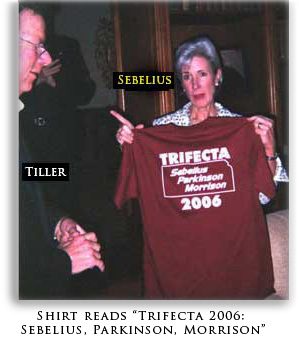Tiller and the Tradition of Frontier Justice

Tune in for what's new in Kansas: It's a web-based news site, and regularly published journal, dedicated to limited government in the great state of Kansas. |
![]()
by Jack Cashill
WorldNetDaily.com - January 14, 2010
Although no one would guess it from the fussy local coverage of Scott Roeder’s trial for the murder of Wichita abortionist George Tiller, the Kansas-Missouri borderlands have a long-storied tolerance for frontier justice.
On a May night in 1856, in an unprovoked attack, John Brown and sons pulled five southern sympathizers from their Kansas cabins and hacked them to death with broadswords.
Today, the state of Kansas honors Brown’s memory at a state historic site and museum. A huge mural of Brown graces the State House in Topeka.
Secessionist guerillas during the war, Frank and Jesse James turned outlaw afterwards. While robbing banks and righting presumed Union wrongs, they killed some thirty people.
Today, Clay County, Missouri honors the James’ memory at a county historic site and museum. I know the story well. I produced the museum’s video.
A century after the “dirty little coward” Robert Ford killed Jesse in his St. Joseph, Missouri home—another historic site—the townspeople of nearby Skidmore delivered some rough frontier justice to Ken Rex McElroy.
The self-proclaimed “King of Nodaway County,” McElroy dedicated his altogether vile life to terrorizing the good citizens of rural Northwest Missouri.
Despite 22 indictments for a host of wrongs--rustling livestock, stealing grain, hijacking farm equipment, burglarizing homes--McElroy avoided conviction every time.
To escape justice, he used the sure-fire, double-barrel strategy of hiring slick Kansas City lawyers and intimidating witnesses.
In 1980, to settle a family dispute, McElroy shot a 70 year-old grocery store owner in the neck. While out on bail, he showed up at a local tavern with rifle and bayonet, boasting about how he intended to finish the grocer off.
By this point, the townsfolk had lost patience with formal justice, such as it was. In one of the more impressive displays of communal solidarity since 1876 Northfield, townspeople surrounded McElroy as he sat in his pickup truck and at least two of them fired away.
Not one of the 40 or so witnesses ever broke. State and federal investigations into McElroy’s murder came to naught. One suspects that investigators were not trying all that hard.
The liberal media—Playboy and Rolling Stone most notably—produced accounts of the killing highly sympathetic to McElroy’s killers.
Harry MacLean did much the same in his excellent retelling of the saga, In Broad Daylight. The book reached the number two spot on the New York Times bestseller list in 1989 and was made into a popular movie.
Scott Roeder, however, can expect no book, no movie, no boyhood home, no historic site, no mural in the Kansas State House, no jailhouse visits from Bob Dylan or Bianca Jagger.
Yet, based on existing evidence, Roeder has a much stronger claim to historical vindication than Brown or the James brothers and one at least comparable to the citizens of Skidmore.
Like the people of Nodaway County, Roeder had watched his victim flout Kansas law for years and get away with it.
Tiller’s chief enabler had been current Secretary of Health and Human Services Kathleen Sebelius. As Kansas governor for six years, she helped Tiller turn this red state blood red.
During her tenure, Kansas had emerged as the indisputable late-term abortion capital of the world, this despite the state’s tough abortion law.
The law allows late term abortions on healthy babies only if bearing the child would kill the mother or cause her to suffer "a severe and irreversible impairment to a major bodily function."
Even a cursory look at the evidence would show that at least 90 percent of Tiller’s late term abortions were in flagrant violation of the law.
Not a single one of these multiple thousands of abortions saved the life of a mother. Just about all involved "severe and irreversible impairments" no more significant than a girl’s anxiety about missing a prom, a rodeo, or even a rock concert.
In 2006, after three years of fighting the state’s oddly liberal legal system to secure patient records, Attorney General Phill Kline charged Tiller with illegally aborting fifteen healthy, viable, unborn babies.
Kline had to go, and Sebelius engineered his exit. She persuaded Paul Morrison, a popular Republican district attorney, to switch parties and run against Kline.
With more than $1 million in indirect backing from Tiller and the eager support of the state media, Morrison prevailed.
One evening after the election, while Morrison was allegedly reviewing the charges Kline had brought against Tiller, Sebelius entertained Tiller and his staff at a private dinner at the governor’s mansion.
There she thanked Tiller for his more than generous help electing Morrison and re-electing herself. The photos are priceless (see below).

To no one’s surprise, Morrison eventually threw out Kline’s charges and, to preserve the illusion of law, filed some lame technical charges on which Tiller would later be acquitted.
Watching all this—he attended the trial--Roeder had to feel much as the citizens of Skidmore did when they saw McElroy back on its streets. In both cases, law had prevailed, but justice had not.
Although Sedgwick County District Judge Warren Wilbert has ruled out a “necessity defense”—the argument that Roeder had to act to prevent a greater evil—the judge has given jurors the option of finding Roeder guilty of voluntary manslaughter.
According to an anxious Kansas City Star reporter, this ruling “would allow the defense to present testimony that Roeder sincerely believed that killing Tiller was necessary to save lives.”
The anxiety is deserved. This testimony, if fairly given, would show just why in 2006 Planned Parenthood gave the Star its top national honor, “The Maggie.”
The jury is not likely to hear any such testimony. When I talked on Tuesday to Roeder’s public defender, Mark Rudy, and offered to share what I knew about Tiller’s practice, he politely blew me off.
Barring the unforeseen, the state of Kansas will be more likely to memorialize Tiller’s boyhood home than Roeder’s.
Pro-lifers will not memorialize Roeder either. Conservatives do not really cotton to murderers the way the left does. There are no Mumias on the right, no Ches, no Peltiers, no Maos, no Saccos, no Vanzettis, never have been.
Roeder has found this out the hard way.


